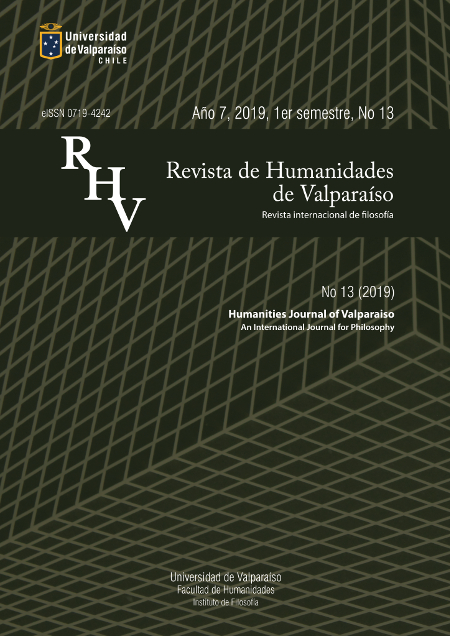Giro dinámico y lógica de la investigación científica
DOI:
https://doi.org/10.22370/rhv2019iss13pp68-89Palabras clave:
juegos lógicos, lógica dialógica, LED, abducción, gramática universal, pirahã, anomalía, novedadResumen
Para presentar la incidencia del giro dinámico en la lógica de la investigación científica, en este artículo comenzamos con una sección que trata de los juegos lógicos como desencadenantes de este giro dinámico en la lógica contemporánea, junto con el programa de dinámica lógica de la información y la interacción. Sucintamente presentamos las principales características de la lógica favorable a la independencia y la semántica juego-teórica (IF-logic y GTS, respectivamente, en Hintikka y Sandu 1997), de la lógica dialógica (Redmond y Fontaine 2011), así como los elementos esenciales de dicho programa. Si bien a partir de cualquiera de estos puntos de vista se cuenta con un elenco de herramientas lógicas para abordar cuestiones más claramente epistemológicas, destacamos el papel de la lógica epistémica dinámica (LED), a la que dedicamos la siguiente sección. Sigue otra en la que entramos en los estudios lógicos de la abducción como uno de los problemas fundamentales de la epistemología contemporánea y, en una nueva sección, en términos de los constructos teóricos de las secciones precedentes, presentamos y explicamos un fenómeno surgido en el campo de la lingüística, el caso del descubrimiento de la lengua amazónica pirahã, que debería ser considerado una anomalía en el marco de la teoría chomskiana.
Descargas
Referencias
Aho, T., Pietarinen, A. (eds.) (2006). Truth and Games. Essays in Honor of Gabriel Sandu. Acta Philosophica Fennica, Vol. 78. Helsinki: Societas Philosophica Fennica.
Alchourrón, C. E., Gärdenfors, P., Makinson, D. (1985). On the logic of theory change: partial meet contraction and revision functions. Journal of Symbolic Logic, 50(2): 510-530. doi: 10.2307/2274239
Aliseda, A. (2006). Abductive Reasoning. Logical Investigations into Discovery and Explanation. Synthese Library, Vol. 330. Dordrecht: Springer.
Aliseda, A. (2014). La Lógica como Herramienta de la Razón. Razonamiento Ampliativo en la Creatividad, la Cognición y la Inferencia. Cuadernos de lógica, epistemología y lenguaje, Vol. 6. Londres: College Publications.
Baltag, A., Smets, S. (2012). The dynamic turn in quantum logic. Synthese, 186: 753-773. doi: 10.1007/s11229-011-9915-7
Barés Gómez, C., Fontaine, M. (2017). Argumentation and Abduction in Dialogical Logic. In L. Magnani, T. Bertolotti (eds.), Springer Handbook of Model-Based Science, 295-314. Dordrecht: Springer.
van Benthem, J. (2011). Logical Dynamics of Information and Interaction. Cambridge: Cambridge University Press.
van Ditmarsch, H., van der Hoek, W., Kooi, B. (2008). Dynamic Epistemic Logic. Synthese Library, Vol. 337. Dordrecht: Springer. doi: 10.1007/978-1-4020-5839-4
van Ditmarsch, H., Nepomuceno, A. (2019). Public announcements, belief expansion and abduction. En O. Pombo, A. Pato y J. Redmond (eds.), Epistemologia, Lógica e Linguagem, pp. 151-161. Lisboa: Centro de Filosofia das Ciências da Universidade de Lisboa.
Everett, D. L. (2014). ‘No duermas, hay serpientes’ Vida y lenguaje en la Amazonia. Madrid: Turner Publicaciones S.L.
Fagin, R., Halpern, J. Y., Moses, Y., Vardi, M. Y. (1995). Reasoning about Knowledge. Cambridge, London: The M. I. T. Press.
Gochet, P. (2002). The dynamic turn in century logic. Synthese, 130: 175-184. doi: 10.1023/A:1014435213120
Hernández, I., Nepomuceno, A. (2011). Lógicas alternativas subyacentes a las prácticas científicas. En O. Pombo (ed.), Lógica Universal e Unidade da Ciencia, pp. 121-140. Lisboa: Centro de Filosofia das Ciências da Universidade de Lisboa.
Hintikka, J. (1973). Logic, Language-Games and Information. Oxford: Clarendon Press.
Hintikka, J. (1997). A revolution in the foundation of mathematics? Synthese, 111: 155-170. doi: 10.1023/A:1004970403579
Hintikka, J., Sandu, G. (1997). Game-Theoretical Semantics. In J. van Benthem and A. ter Meulen (eds.), Handbook of Logic and Language, pp. 361-410. Amsterdam: Elsevier.
Hintikka, J. (1998). What is abduction? The fundamental problem of contemporary epistemology. Transactions of The Charles S. Peirce Society, 34(3): 503-533. doi: 10.1007/978-94-015-9313-7_4
Luna, C. D. (2001). Una Generalización del Modelo AGM de Cambio de Creencias. Inteligencia Artificial: Revista Iberoamericana de Inteligencia Artificial, 5(13): 23-32.
Marion, M. (2006). Hintikka on Wittgenstein: From Language-Game to Game Semantics. Acta Philosophica Fennica, 78: 255-274.
Meyer, J. J. Ch., van der Hoek, W. (2004). Epistemic Logic for AI and Computer Science. Cambridge: Cambridge University Press.
Nepomuceno, A., Soler, F., Velázquez, F. R. (2017). Abductive Reasoning in Dynamic Epistemic Logic. In L. Magnani and T. Bertolotti (eds.), Springer Handbook of Model-Based Science, pp. 269-293. Dordrecht: Springer, doi: 10.1007/978-3-319-30526-4-13
Nevins, A., Pesetsky, D., Rodrigues, C. (2009). Pirahã exceptionality: A reassessment. Language, 2(85): 355-404.
Popper, K. R. (1980). La lógica de la investigación científica. Madrid: Tecnos.
Rahman, S., Clerbout, N., Keiff, L. (2009). Dialogues and Natural Deduction. In G. Primiero (ed.), Acts of Knowledge, History, Philosophy, Logic, pp. 301-336. London: College Publication.
Redmond, J. and M. Fontaine (2011). How to Play Dialogues. An Introduction to Dialogical Logic. Londres: College Publication.
Saarinen, E. (ed.) (1979). Game-Theoretical Semantics. Essays on Semantics by Hintikka, Carlson, Peacocke, Rantala, and Saarinen. Dordrecht: Springer.
Schurz, G. (2011). Abductive Belief Revision in Science. In E. J. Olsson and S. Enqvist (eds.), Belief Revision meets Philosophy of Science, pp. 77-104. Dordrecht: Springer. doi: 10.1007/978-90-481-9609-8-4
Soler, F. (2012). Razonamiento abductivo en lógica clásica. Londres: College Publications.
Descargas
Publicado
Número
Sección
Licencia
Aquellos autores/as que tengan publicaciones con esta revista, aceptan los términos siguientes:
- Los autores/as conservarán sus derechos de autor y garantizarán a la revista el derecho de primera publicación de su obra, el cual estará simultáneamente sujeto a la Licencia de reconocimiento de Creative Commons (CC BY-NC-ND 4.0 International) que permite a terceros compartir la obra siempre que se indique su autor y su primera publicación esta revista.
- Los autores/as podrán adoptar otros acuerdos de licencia no exclusiva de distribución de la versión de la obra publicada (p. ej.: depositarla en un archivo telemático institucional o publicarla en un volumen monográfico) siempre que se indique la publicación inicial en esta revista.
- Se permite y recomienda a los autores/as difundir su obra a través de Internet (p. ej.: en archivos telemáticos institucionales o en su página web) antes y durante el proceso de envío, lo cual puede producir intercambios interesantes y aumentar las citas de la obra publicada. (Véase El efecto del acceso abierto).






